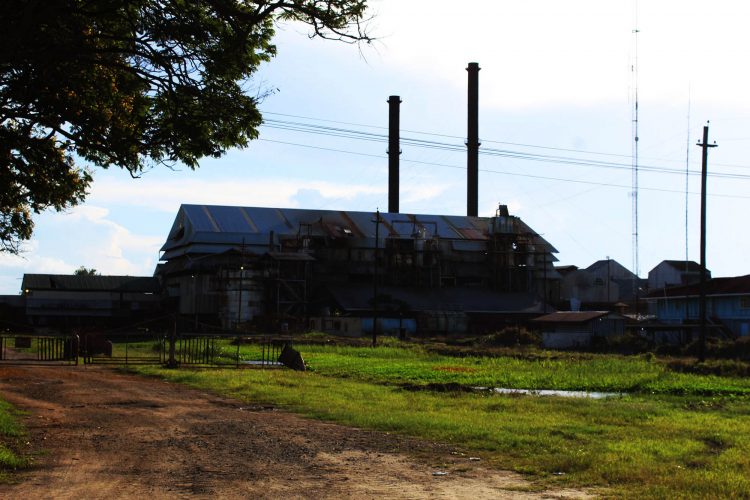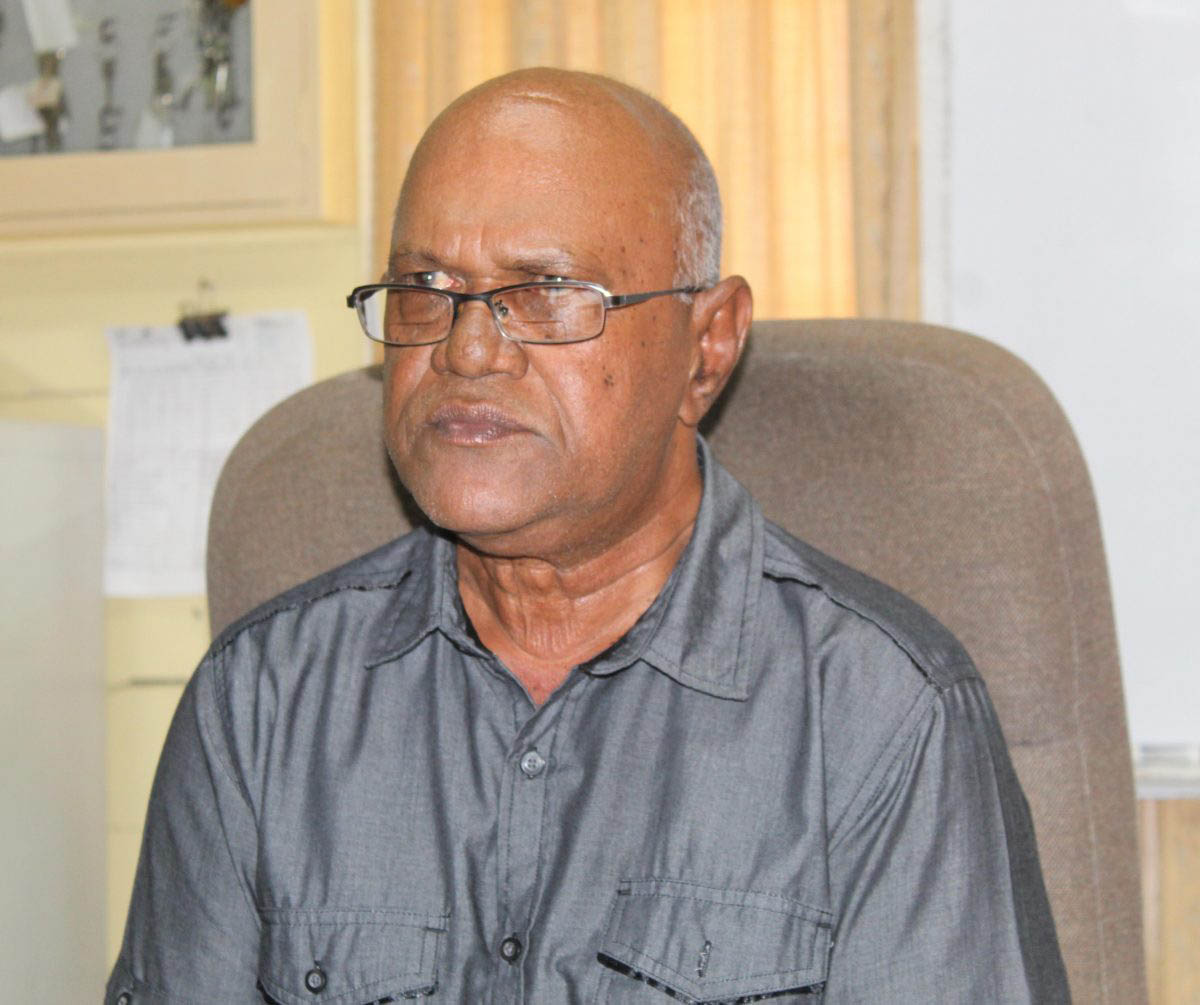Following a special investigation, Auditor General, Deodat Sharma earlier this year discovered that the Rose Hall Estate overpaid close to $5m to two contractors for mechanical tillage works in 2021 after the estate deviated from the stipulated rate of $7500 per hour to $8500 per hour.
Based on the report seen by Stabroek News, GuySuCo’s Chief Internal Auditor requested the services of the Audit Office to conduct a review of contracts relating to the overpayment of a total of $4, 906,413. Colin Nathoo was overpaid $3, 830,000 while Deonarine Teajman was overpaid $1, 084,000.

Sharma when contacted yesterday by Stabroek News confirmed that a special investigation was done but stated that he could not comment on the probe itself.
The report stated that the overpayment stemmed from the fact that the two contractors were paid an hourly rate of $8500 instead of the stipulated $7500 after a decision was taken by the estate to pay based on hours worked.
One of the overpaid contractors worked longer hours since his machines did not have the required horsepower as stipulated in the contracts and smaller machines were used instead. And the second contractor although having the requisite machines and implements was faced with poor conditions and inexperienced operators that the estate personnel had to train – ultimately resulting in constant, time consuming overhauling of substandard work.
Based on this discovery, the Auditor General recommended “appropriate disciplinary action” against the Estate Manager, Aaron Dukhia, the estate’s Agriculture Manager, Bishan Dhanpat, and M Jaffar, Engineer Field Operations, and “any other culpable officer(s) who aided in the decision for the deviation of rates per contracts.”
The Audit Office also recommended that the overpaid sums be recovered from the two contractors and that all payments to a contractor must be made in accordance with the contract, noting “any deviation from contract should be properly documented in writing.”
The recommendations further noted that all contracts awarded through the corporation’s head office must be “properly monitored to ensure adherence to required procedures.”
In the 16-page report, the Audit Office found due diligence was not followed by the estate, and that tractors used by the contractors did not have the required specification as per contracts. “This would have resulted in more time being spent on tillage since a smaller tractor was used”, the Audit Office found.
As such, a total of $12.258 M was paid to the two contractors using the proposed rate of $8500 instead of the current rate of $7500 – thus overpaying the two contractors a total of $4,914,650 M. “No approval was seen for the increase”, the report revealed.
The Audit Office in concluding the investigation stated, “Even though the contractors were paid using the proposed rate, before a payment request was made by the contractors, these payments were verified by the superintendent of works, certified by the assistant manager and approved by the departmental head, finance manager and the estate manager.”
Insurance policy
It was also discovered that one of the overpaid contractors breached his insurance policy when he undertook the contract with the Rose Hall Estate, as the insurance policy covered use for private purposes in agriculture and did not cover use for hiring. Further, no Certificates of Insurance and Registration were seen for the tractors used by the second overpaid contractor. The findings also stated that this said contractor although not having the requisite tractors with the required horsepower as per the contract “was paid according to the number of hours worked.”
In the report itself, Dukhia agreed that there were deviations from the approved rates. However, according to him, a decision was taken by the estate “due to adverse conditions of fields and weather at the RH, not attracting contractors due to the conditions and fixed rates, inexperienced contractors, operators and time for training by estate.”
In further justifying the reported verbal agreement to deviate from the rates, he said that there was very little support from the senior management at the head office despite the request “to visit the estate and provide advice and examine the progress of work and constraints faced in the tillage.”
According to him, “decisions had to be taken by the estate to ensure the GOG (Government of Guyana) mandate is achieved.”
In his response via letter to the office of the AG, he explained that at that stage the estate was faced with two options; remove the contractors due to the inability to achieve the productivity indices and continue only with the estate’s “refurbished tractors which were reduced from 6 to 3 (and) which would only achieve 50% of tillage and replanting.”
The second option, which the estate decided upon, was to continue to work with the contractors based on their capability with another approved payment system. This he said would have accelerated the tillage and replanting programme along with the estate machines.
He noted too, that at the time no other contractor was willing to work at the Rose Hall Estate under the prevailing conditions.
In the report, Dukhia stressed that a decision was therefore taken by the estate to continue to work with the contractors “to achieve the primary objective of tillage and replanting in order to realize the 2023 second crop reopening.”
The estate’s response further noted, that the estate was under “severe pressure” to increase cane production in the second crop of 2021 to facilitate the reopening in the second crop of 2022. “This was particularly important bearing in mind the estate’s performance was under review and increase tillage/re-planting was therefore (of) paramount importance.”
The estate’s response in the report noted that the reopening was subsequently pushed to the second crop 2023.
Meanwhile, the Audit Office also spoke to Haseef Yusuf, the Finance Manager at the estate who confirmed the deviation in the hourly rate. According to Yusuf, it was “only authorized since it was mutually agreed between the company’s representatives” who according to him in this case were the estate manager and agriculture manager.
Further, Yusuf said that he was told that the contractors’ machines and equipment “are not the required standard and the condition of the field made it (prohibitive) for the contractors to achieve the required 2.25 hours per hectare.”
Meanwhile, the estate’s Agriculture Manager, Dhanpat, in his response to the Audit Office while confirming the deviation from the approved rate said that it was a decision taken by the estate manager, himself and the tillage manager “in an effort to achieve the parameters.”
According to Dhanpat, the estate was faced with the dilemma at that time of having no new tractor and was forced to continue with the contractors.
Notably, he said, that even after the decision was taken to pay the rate to open the land there were still issues with payment, noting, that one contractor took off his machines on four occasions while another changed operators on three occasions. “With all the constraints we still had to continue with the contractors to meet the estate’s objectives”, he stressed.
In the report, the estate’s Engineer, Field Operations, Jaffar also supported the claims that one of the contractors did not have the requisite tractors and plough as stated in the contract.
According to him, after the trial was done the contractor worked 32 hours on 28/08/2021 and only completed 6.1 ha instead of 14.2, and following a discussion a “decision was taken to pay 32 hours worked.”
Resignation
Meanwhile, Stabroek News was reliably informed through several sources at GuySuCo and the sugar union GAWU that Dukhia, who was tasked with reopening the Rose Hall Estate has resigned as the estate’s manager.
According to information gathered, Dukhia tendered his registration in early August. When contacted yesterday, Dukhia stressed that he did not resign in connection with the special investigation. In fact, he disclosed, that he had resigned once before in June, 2021.
According to him, in both instances, his resignations were a result of the Chief Executive Officer, Sasenarine Singh who Dukhia said he found to be toxic.
He explained that in June last year after a meeting with the Minister of Agriculture, Zulfikar Mustapha and a Director of GuySuCo’s Board, he decided to stay on. However, he is contending that at this time he does not see the possibility of continuing to work. He noted that he gave it a “chance but things got worse.”
Dukhia, who has 41 years of experience with GuySuCo, also said he had hoped to follow through on his task to “see the estate grind.” Adding that although it pains him to leave after the task is only 50% completed, he believes that it is the best decision at this stage for him.
Efforts to contact the CEO yesterday on both the findings of the special investigation and Dukhia’s resignation proved futile.
However, in the report of the investigation, it was stated that the auditor reviewed an email from the CEO which stated that “he will be holding the estate managers and agriculture managers accountable for any variation from the cost per hectares.”
Further, it was also stated in the email that the cost to plough a hectare of the field would be raised from December 1, 2021, while the investigation discovered that all the overpayments were made before December, 1 last year.


